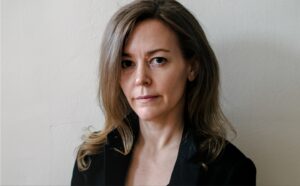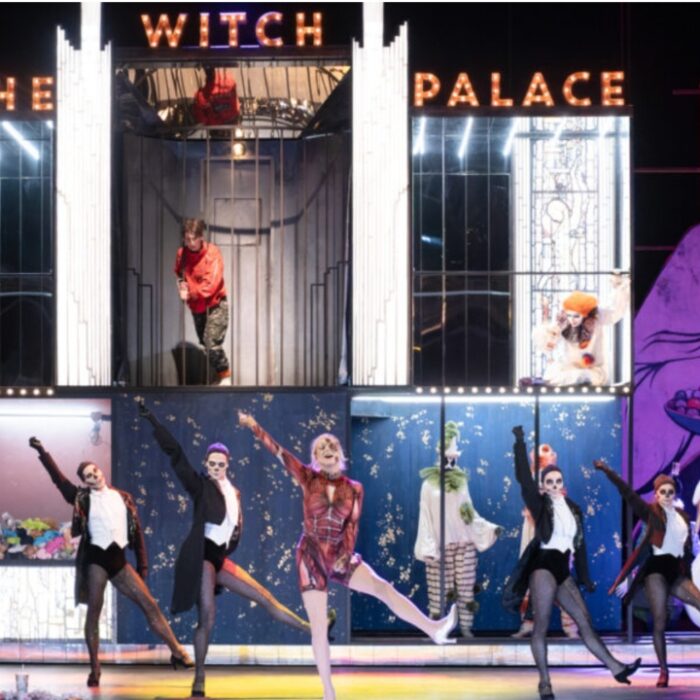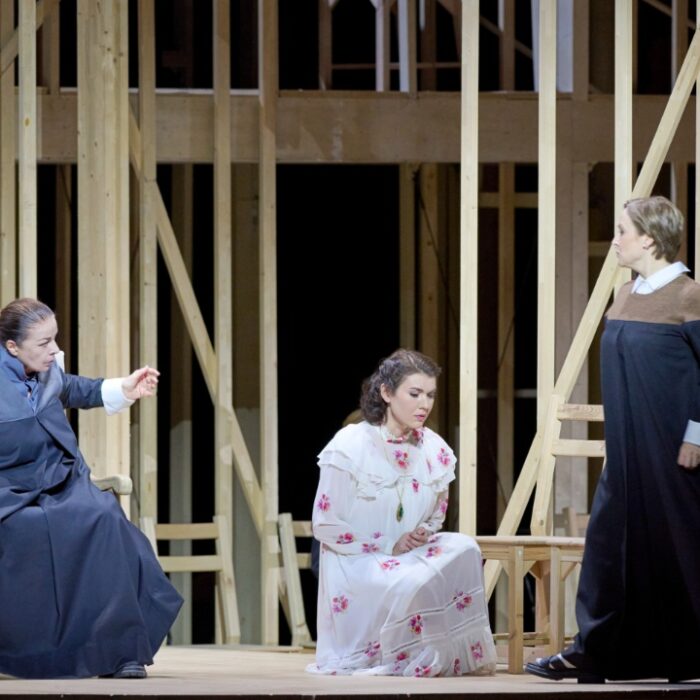
Sofia Opera & Ballet 2025 Review: Tannhäuser
Premiere of Director Plamen Kartaloff’s New Production of Wagner’s Masterpiece Is a Historical Triumph for Humanity
By Jennifer Pyron(Photo: © Sofia Opera & Ballet)
Sofia Opera & Ballet celebrated the opening night of their annual Wagner Festival on June 26, 2025 with director Plamen Kartaloff’s new production of “Tannhäuser.” Academic Professor Kartaloff is a member of the Bulgarian Academy of Sciences and as director of Sofia Opera & Ballet his mission is to make a conscious shift in the opera world by focusing on humanity and illuminating the power of art by examining evolution and opera together with his local community.
Kartaloff’s “Tannhäuser” creatively builds and discovers the heart of a traditional art form through contemporary design and critical thinking. He chooses love and awareness as its guide and this can be felt all throughout his production, featuring a cast of Bulgarian creatives, including Martin Iliev as Tannhäuser, Petar Buchkov as Hermann, Tsvetana Bandalovska as Princess Elisabeth, Atanas Mladenov as Wolfram, Emil Pavlov as Walther, Angel Antonov as Heinrich, Stefan Vladimirov as Biterolf, Angel Hristov as Reinmar, Gabriela Georgieva as Venus, and Maria Pavlova as a Young Shepherdess.
The levity of Wagner’s composition, balanced with an artfully crafted set design, lighting and passionate singing and playing of musicians alike, makes this “Tannhäuser” a historical triumph worthy of notable documentation for future generations to come.
Plamen Kartaloff’s Production Details
Kartaloff’s production explores a range of interpretations centered around “Tannhäuser’s” thematic question: “What is love?” In his expansive thinking process, Kartaloff examines “man torn between two closed societies.” And while his creative response to this reality juggles opportunities to answer this one question, it is his imagination’s vastness that cultivates one’s own enrichment through internal reflection and surrender. Ultimately, Kartaloff leaves the question unanswered, revealing how man’s experience of life is open to interpretation by anyone from any walk of life. In this way, his production mirrors the mental complexities of Wagner’s original intention for his work, while ushering it into modern day with delight. And this is no easy feat.
Kartaloff looks further into Wagner’s libretto with Venus as “the society of pleasure–a trap of desire,” Wartburg as “the society of harmony–a world without mercy,” Tannhäuser as “a metaphor for modern man and a hope denied by human institutions,” and Elisabeth as “a symbol of pure compassion.” He leaves one asking the following questions: “Can contemporary society accept the one who is different? Can we forgive not the sinner, but the one who reveals the inconvenient truth about ourselves?”
Kartaloff’s production reveals the mystery of life hanging in the balance of a volatile world. In short, our very own reality. He cracks open the heart of Wagner’s “Tannhäuser,” combining the old and the new to unmask the present in an abstract time and space on stage that makes one feel limitless in their own exploration of truth.
He says, “A fortunate coincidence marks the premiere of ‘Tannhäuser’ in the sacred Jubilee year of 2025 for the Latin Christian world. Its motto is ‘Pilgrims of Hope.’ In Richard Wagner’s opera, we can perceive a moral connection between the libretto and the music and the Church’s messages to society–calling for faith, optimism, and hope in today’s world of war, a world that has forgotten the human values of virtue, forgiveness, redemption, and salvation from the sins of arrogance and greed, from excess and the lust for power. In this context, my production of ‘Tannhäuser’ becomes a contemporary drama–not merely about sin and forgiveness, but about a man who seeks wholeness and freedom in a world torn between extremes…”
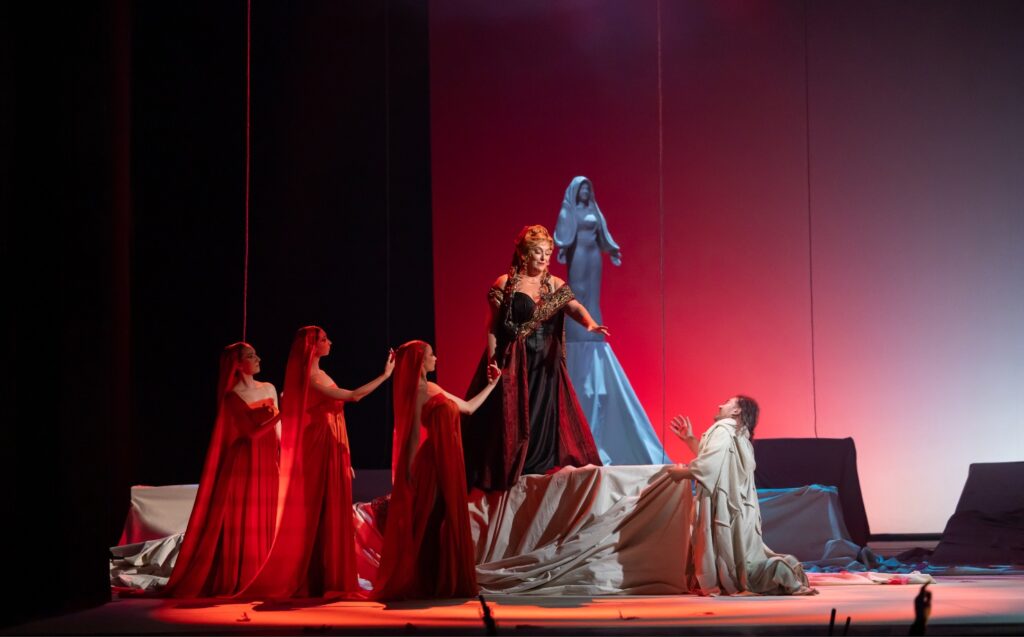
(Photo: © Sofia Opera & Ballet)
Visually Stunning Set Design, Lighting & Costumes
Kartaloff’s “Tannhäuser” is a feast for the senses with luscious set designs rich in color, abstract interpretations of costumes made with only the finest fabrics and materials, sensual pleasures unfolding through careful choreography, minimal yet luminous lighting, excellent use of negative space, and symbolism abounding in every scene. Instead of getting lost in the mix of bringing Wagner’s traditional work into modern day, this production sets a new standard for what it means to intelligently interpret what is already present–the human experience through the lens of Sofia’s local creative community.
Set designer Sven Jonke’s aesthetic expands and contracts visual complexities using collapsable materials such as inflatable plastic drapes, transparent opaque sheets, canvas drop cloths, heavy plastic tarps, ropes, and a large white disc that hangs tilted above the stage, ready to drop at any moment, that lifts up to reveal a perfect circle all along. Lighting designer Andrej Hajdinjak takes into account every one of these details and uses exact lighting, dispersed with occasional smoke machine billows, that drafts an obscure ethereal radiance meant to captivate one’s attention in every scene. Costume designer Hristiyana Mihaleva-Zorbalieva’s excruciatingly beautiful costumes are museum worthy. She details the most ornate symbolism in this production through her craft, especially Elisabeth’s transparent peach colored cape that transcends while she traverses about the stage. I could not take my eyes off the exquisiteness of these details. Bravo!
Movement by Maria Ilieva and the choreography of the Sofia National Ballet fit perfectly with the sensual surroundings, especially in the early scenes. The opening act, when Tannhäuser awakens in Venus’ embrace, showed dancers pairing off into twosomes, threesomes, all-somes, for an interpretation of orgies derived in love’s blissfulness. This was all done in conscious and careful thoughtfulness that felt natural and beautiful. It is very rare to observe scenes like this without feeling off for at least one cast member, but in this production every member partook in what felt most comfortable for them and in mutual respect for their cast mates. I particularly loved watching Gabriela Georgieva as Venus, rolling and writhing in sexual nuance across the front of the stage floor. Her costume washing over her body as she stretched her arms out and touched her chest in exhilarating excitement while listening to Tannhäuser’s voice was unforgettable. Georgieva embodied the confidence and extravagance of what her character confides–a woman’s right to satisfy herself and her partner(s), as she pleases. Her voice was magnificent as she sang and it’s understandable why she is a favorite here in Sofia and beyond.
In this “realm of endless delight, but also of forgetfulness–where pleasure repeats itself until all essence is lost,” one might feel satiated in their own desires playing out on stage. This production showed the extremes of the human experience, but never overdid it. When introduced to Wartburg’s “society of spiritual order and lofty mortality, yet devoid of compassion,” the afterglow of the opening’s carnal delights still carried on. There was no stop-and-go feeling between scenes, and this made the production carry along smoothly as it unfurled. The cast was also very prepared and involved in their own interpretations.
Everything felt too good to be true, with two intermissions that came too quickly every time. I would absolutely see this production again because I loved it that much. I will also never forget hearing the quiet humming of Wagner’s music from members in the audience. I had tears in my eyes for most of this opening night, feeling grateful to be surrounded by the open arms welcoming me into their community here in Sofia, while being held by Wagner’s “Tannhäuser” is a gift of a lifetime.
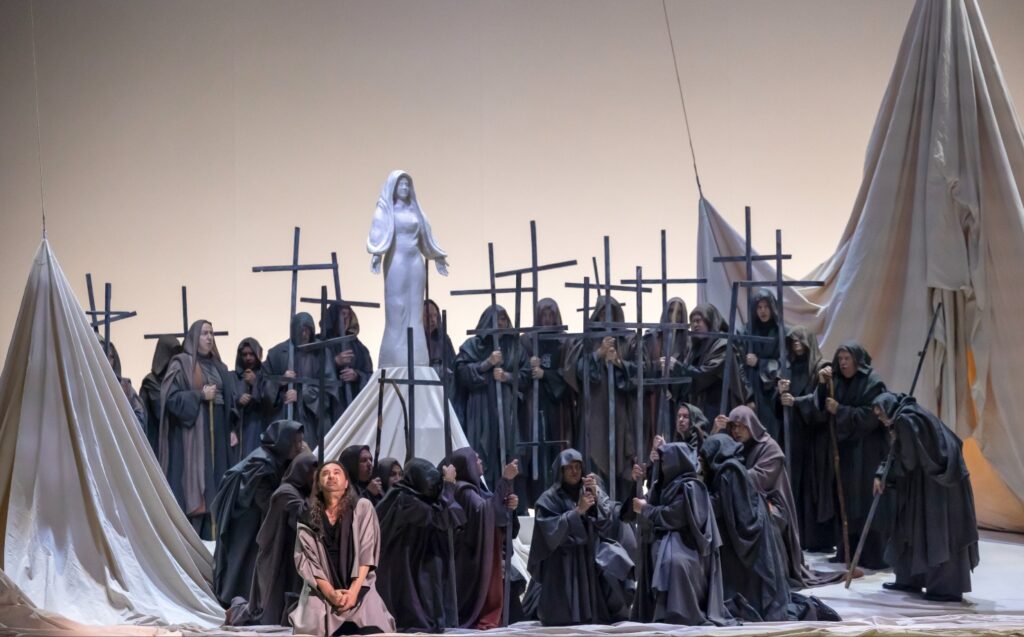
(Photo: © Sofia Opera & Ballet)
Stellar Singing & Musical Development
Conductor Constantin Trinks lead the Sofia Opera Orchestra & Chorus, and cast of outstanding singers in this production, highlighting the elevated quality of local talent and international acclaim.
The Overture paved the way for all musical highlights to come. Trinks showcased the orchestra’s detail oriented dynamics and joyful playing with aplomb. The musicians evoked nostalgia and a deep sense of honor for Wagner’s music. They played together in harmony and their communion could be felt. Audience members leaned towards their loved ones, gasped when the composition’s strings elated in celebratory swells, and quietly hummed along in all seriousness and utmost respect for Wagner’s finest work. The entire house was sold out and everyone in the hall was on the same page–opening night of the Wagner Festival in Sofia is a spectacular experience to behold!
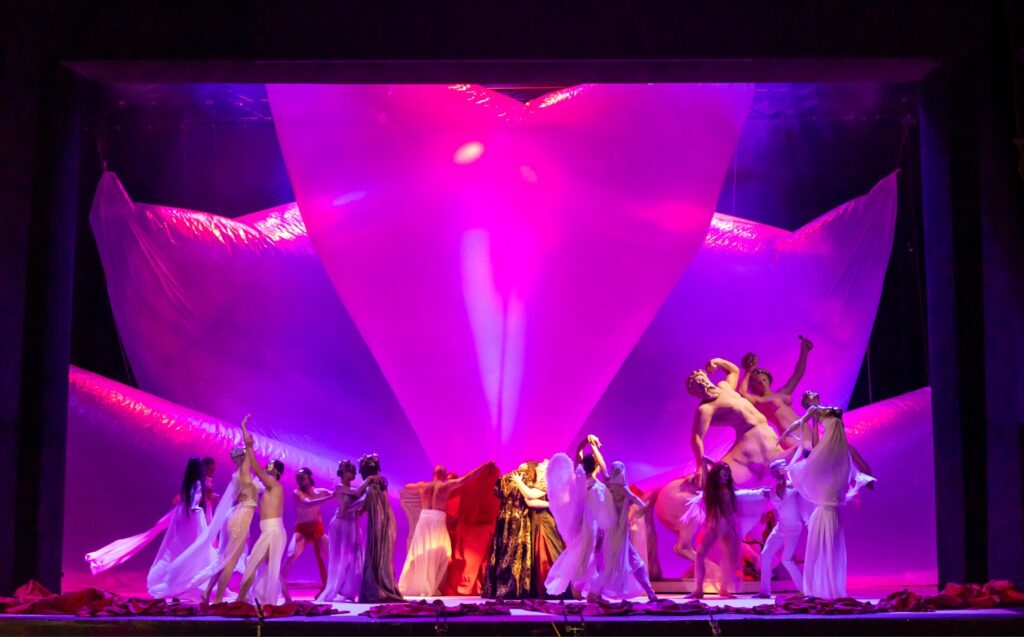
(Photo: © Sofia Opera & Ballet)
The Bacchanale in Venusberg radiated with sexual energy and virility. It was a very impressive opening that featured an array of reds, purples and brilliant magentas, with choreography that played out life’s “endless” pleasures in Venus’ cave near Eisenach. Tannhäuser’s “Hymn to Venus” (Act one, scene two), “Dir töne Lob! Die Wunder sei’n gebriesen Dank deiner Huld! Gebriesen sei dein lieben,” was Martin Iliev’s shining opening moment. His baritone resounded across the hall and his rich vocal quality brought to life the body of Wagner’s score. Iliev transformed into Tannhäuser before he took to the stage, and there was a physicality to his role that felt it had been lived in, made flesh. Very rarely do singers actually transform themselves before they take to the stage for a production, but in this case Iliev set the bar very high. I watched as his face melted in the loving embraces of Venus, coming into excruciating ecstasy with her touch. He vocally elicited a baritone that rang pure and true. His upper register, middle voice and lower register were aligned. All one could do throughout his performance was just enjoy the ride. Iliev really took us there in every way possible. Bravo!
The Pilgrim’s Chorus (Act one, scene three) “Zu dir wall ich, mein Jesus Christ,” was tender and uplifting. The chorus sounded lively and joyous in their singing. The acoustics of the hall enveloped listeners in a warmth of sound, creating a balm for the soul.

(Photo: © Sofia Opera & Ballet)
Elisabeth’s opening aria (Act two, scene one), “Dich, teure Halle, grüß ich wieder,” showcased soprano Tsvetana Bandalovska’s vocal agility and outstanding quality. Her voice stretched like an ethereal silver web of sound into the opera hall. Her vocal phrasing was pure and her upper register shone bright. Bandalovska as Princess Elisabeth brought to mind Wagner’s genius in this opera, making the music a spiritual experience grounded by the human experience. I observed Bandalovska’s actions and listened to her vocal inflections as she mourned in pain and suffering over the deep love she carried for Tannhäuser. This gut wrenching drive carried beyond what one might have expected, delivering a performance one might never forget. The ways love can wield the most innocent of hearts into the unknown as they fall into the depths of its waters is unforgettable as Bandalovska sings and hopes for Tannhäuser’s deliverance. I am still reliving and reimagining her voice in my head. Bandalovska’s “Elisabeth’s prayer” (Act three, scene two), “Allmächt’ge Jungfrau! Hör mein Flehen,” will stay in my heart forever.
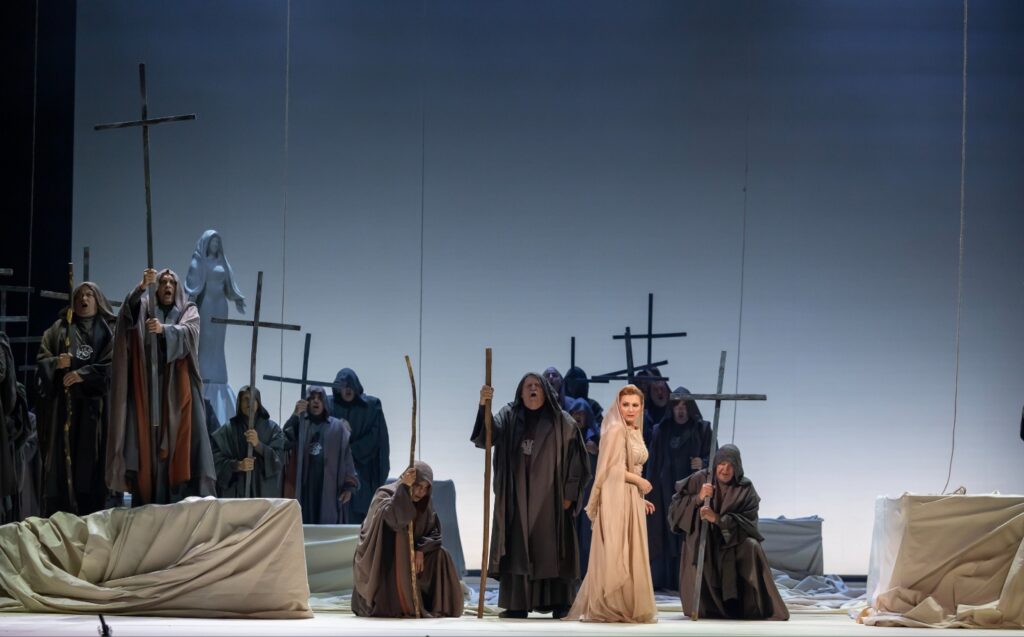
(Photo: © Sofia Opera & Ballet)
The Pilgrim’s Chorus (Act three, scene one), “Beglückt darf nun dich, o Heimat, ich schauen,” developed into a vocal uprising among chorus members and audience members alike. Their voices carried in union of peace and harmony, enriching the production as a whole and clearing the path for one of opera’s greatest arias of all time: Wolfram’s Hymn to the evening star, “O du mein holder Abendstern.”

(Photo: © Sofia Opera & Ballet)
Atanas Mladenov as Wolfram delivered a performance of his life in this production. His voice was phenomenally articulate as his brilliant baritone soared while he sang Wolfram’s Hymn. Conductor Trinks made sure the orchestra’s gentle lullaby carried him forward as his voice lifted into the heavens. Audience members were in tears while he performed and the subtle lighting fell across his body in stoic solitude. All was quiet for this most precious moment in time: one of Wagner’s finest arias ever written and one of opera’s most unforgettable passages. Mladenov’s voice ushered this production of “Tannhäuser” into another realm and beyond.

(Photo: © Sofia Opera & Ballet)
Tannhäuser’s Roman Tale (Act three, scene three), “Romerzählung. Inbrunst im Herzen,” was the final crowning achievement of opening night when Iliev’s voice oscillated between torment, terror, trauma, and truth. His interpretation was so precise and powerful, there seemed to be nothing else outside this world of his. Recounting his experience as a man against all odds, hopeful to feel forgiven and free in his lifetime, Iliev’s eyes glistened with glory not because he would soon find peace, but because he was no longer afraid to face and feel his own reality. Iliev transformed into a man of total consciousness, his body dripped with perspiration as his face revealed the harshest realizations of his own internal landscape while singing out loud. One could only imagine how Iliev prepared for this role, the countless hours of taking on such a challenge. There was not a dry eye in the audience by the end of his aria. A blanket of resolution enveloped the hall during this moment. There arose a new level of awareness about what was just witnessed–Iliev’s greatest vocal achievement of Wagner’s most beloved aria made new in modern day.
Kartaloff’s vision was manifested successfully and I was reminded of what he said about this production in this moment, “What remains in the center is the human soul–torn between body and spirit, between guilt and hope, between despair and forgiveness. And the stage–just like Wagner’s music–is nothing but its resonance.”
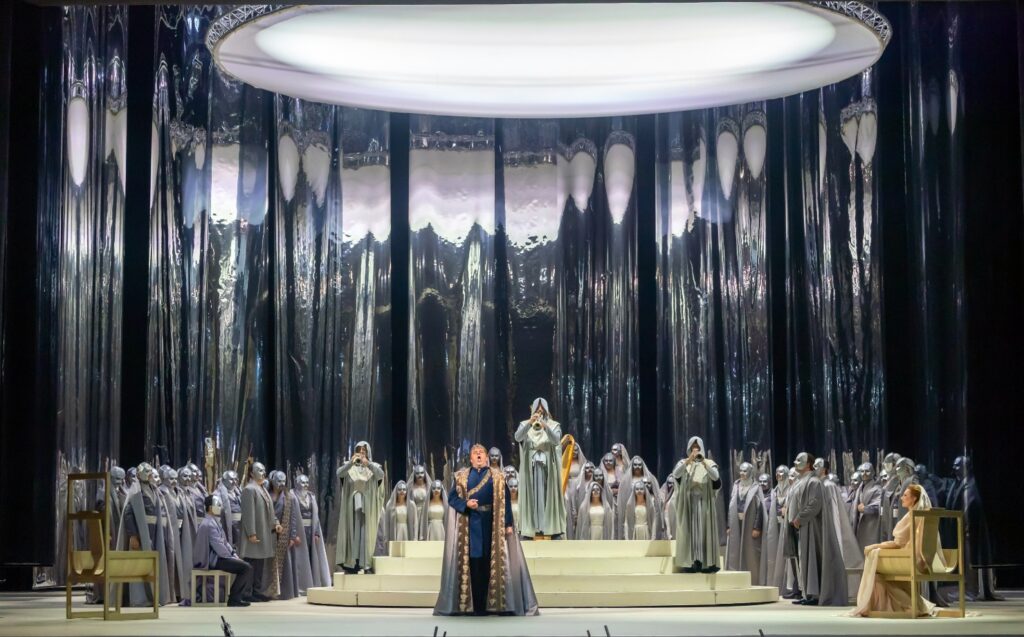
(Photo: © Sofia Opera & Ballet)
More Cast Highlights
Petar Buchkov as Hermann was perfect in this role. His bass extended into the hall with magnificence as he sang. There was a comforting quality about his demeanor as well that made his character feel real-life. His interactions with Elisabeth and the minnesingers revealed a deep respect felt among his cast mates towards his leadership in this role. His costume was also one of my favorites, featuring divine blues and sparkling crystals inlaid ornately around his neck and extending into a robe of mystical mastery.
Emil Pavlov as Walther sounded glorious in his role as one of the minnesingers. His tenor resonated in clarity and high level vocal quality. His upper register sounded spectacular in the hall especially.
Stefan Vladimirov as Biterolf performed with a remarkable rich bass voice. As he praised love to be the most notable emotion of all, his voice felt like it came from his own heart. His performance was very moving.
Angel Antonov as Heinrich gave an unforgettable performance. His tenor voice had a special quality that set it apart from others and I would love to hear him again. Antonov’s Heinrich is masterclass worthy.
Angel Hristov as Reinmar displayed a rich bass voice as he sang his convictions. His facial expressions and acting came across as natural and compassionate, embodying his character’s disposition.
Maria Pavlova as a Young Shepherdess was transcendent in her role. As she walked gracefully across the stage there was a luminous glow about her. Her voice rang true as she sang and made for a special moment in time.
The Three Graces (Courtiers of Venus), featured Malena Djurova, Monika Yanebova, and Polina Videnova. Their costumes were one of my favorites as well, made with an eye-catching red draped across their bodies, connecting one another as they moved in unison across the stage. This reminded me of the Metropolitan Opera’s scene in Philip Glass’ “Akhnaten” when Akhnaten and Nefertiti come together on stage with their costumes extended in waves of red that seem to go on forever. There is something so heart-wrenching when costumes make such a bold statement in a production like this. Congratulations Hristiyana Mihaleva-Zorbalieva on your designs.
Ballet members and their roles included Mina-Vasilia Stoyanova (Leda), Rafael Katz (Swan), Charlotte Berard (Susanna), Radul Roglev and Dario Yovcevski (Two Old Men), Ivan Shopov (A Man Ploughs the Earth), Tiri Berge (Helen), Jake Milston (Paris), Enrico Grivo (Eros), Ramona-Nicol Miteva (Psyche), Vera Aspridi (Europa), Matthew Whittle (White Bull), Deyan Ivanov (Dionysus), Beatrice Bee, Debora Tosheva, Zhaklin Draganova, and Gabriela Kesyakova (Maenads).
The assistant director of this production was Yulia Krasteva, chorus conductor was Violeta Dimitrova, multimedia artist was Elena Shopova, concertmasters included Slava Atanasova and Maria Evstatieva, stage managers included Vyara Karabeloyova, Teodor Georgiev, and Militsa Ristova. Corepetiteurs included Agnes Dankova, Yolanta Smolyanova, Mira Teofilova, Stoyan Martinov, Denitsa Petrova, Svetlana Ananievska, and Tomas Gribov. Head of production was Christian Stoyanov and artist Nella Stoyanova. Translations were by Lalka Todorova, title operator Antoaneta Aleksova and Yuliya Krasteva, and prompter Draga Machuganska.
The second performance of Kartaloff’s new “Tannhäuser” will occur on July 5, 2025 to conclude this season’s unforgettable Wagner Festival.

(Photo: © Sofia Opera & Ballet)
